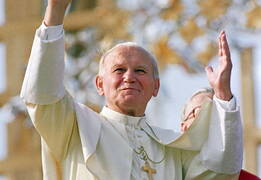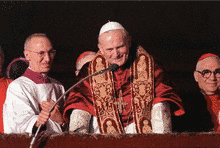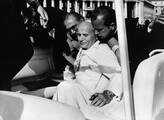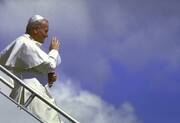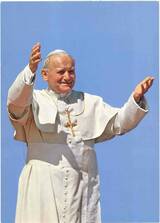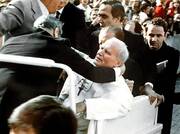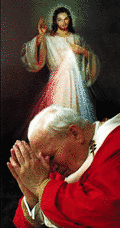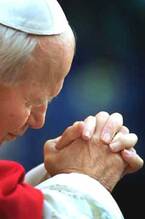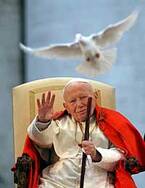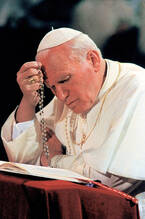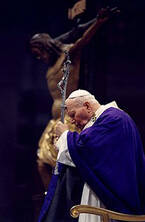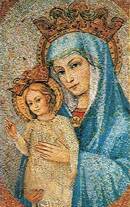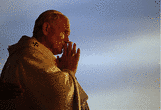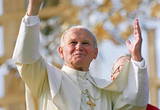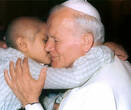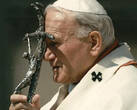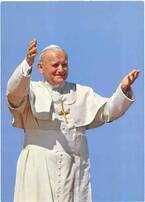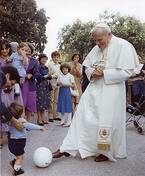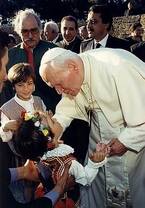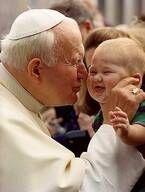Pope Saint John Paul II - Papa Wojtyla
Karol Józef Wojtyła born on 18 May 1920 in Wadowice, Poland. Ordained on Feast of All Saints, 1 November 1946. Auxiliary Bishop (1958–1964) & Archbishop of Kraków (1964–1978). Cardinal-Priest of San Cesareo in Palatio (1967–1978)
Elected Pope 16 October, inaugurated 22 October 1978
Assassination attempt on Feast of Our Lady of Fatima, 13 May 1981. Died on vigil of Divine Mercy Sunday, 2 April 2005. Beatified by Benedict XVI on Divine Mercy Sunday, 1 May 2011. Canonized (with John XXIII) by Pope Francis on Divine Mercy Sunday, 27 April 2014
Motto: Totus Tuus Feast day: 22nd October
Many of Totus2us's podcasts feature beloved John Paul II:
Catechesis with Pope St John Paul II (JPII's teaching) St John Paul II, We Love You (testimonies)
Papa's Words (messages & homilies) Novenas (some encyclicals & apostolic exhortations read in full)
World Youth Days (young people's testimonies & JPII's words) Man for Others (JPII's inspiration to priests).
Election & Inauguration of Pope John Paul II
Saint John Paul II
""Fear not to welcome Christ and accept his power. Help the Pope and all those who wish to serve Christ and by his power to serve the human person and the whole of mankind.
Do not be afraid. Open wide the doors to Christ. To his saving power open the frontiers of states, economic and political systems, the vast realms of culture, civilization, and development.
Do not be afraid. Christ knows 'what is in humans'. He alone knows!" (16th October 1978)
3 2us by Mgr Leo Maasburg ![]()
"John Paul II was a very courageous man, not only during the Nazi occupation when he was studying for the priesthood himself secretly and was ordained priest. But also later on in his life he never shrank back from things which his heart told him to do."
3 2us by Father Greg Morgan ![]()
"He was such an astonishing human being and there are two attributes that I really want to bring to the fore. The first is very simple: his humanity. What an incredible human being, which I think is something we often neglect to examine, how important our humanity is. The second I say something about is his capacity to witness without fear."
John Paul II, the Pilgrim Pope
During the 26½ years of his pontificate, John Paul II was a pilgrim to 129 different countries on 104 apostolic voyages, traveling 1,247,613 km (approx 750,000 miles). Click here to see which countries JPII visited when, watch Vatican footage, link to the countries & read JPII's encouraging words.
JPII described: "These trips are visits to each local Church and demonstrate their place in making up the universality of the Church.. Each trip made by the Pope is 'an authentic pilgrimage to the living sanctuary of the People of God'... the Pilgrim-Pope feels at home everywhere, even "among strangers". The proof of this lies in the relationship that they have with him."
The Wisdom of Saint John Paul II
During his 26½ years as Bishop of Rome, JPII gave us great wisdom and teaching at his Wednesday General Audiences. The themes of JPII's catechesis were:
Theology of the Body (129 audiences: 1979 - 1984)
Catechesis (7 audiences: 1984 - 1985)
God the Father and Creator (60 audiences: 1985 - 1986)
Jesus Christ, Son of God and Saviour (97 audiences: 1986 - 1989)
The Spirit, Giver of Life and Love (82 audiences: 1989 - 1991)
The Church (137 audiences: 1991 - 1995)
Mary, Mother of God (70 audiences: 1995 - 1997)
The History of Salvation (119 audiences: 1997 - 2001)
The Divine Office, Bible Readings
Papa Woytyla wrote fourteen encyclicals:
1) Redemptor Hominis - The Redeemer of Man ![]()
2) Dives in Misericordia - Rich in Mercy
3) Laborem Exercens - Performing Work
4) Slavorum Apostoli - Apostles of the Slavs
5) Dominum et vivificantem - Lord and Giver of Life ![]()
6) Redemptoris Mater - The Mother of the Redeemer ![]()
7) Sollicitudo Rei Socialis - Solicitude for social things
8) Redemptoris Missio - The Mission of the Redeemer
9) Centesimus Annus - One Hundred Years
10) Veritatis Splendor - The Splendour of Truth
11) Evangelium Vitae - The Gospel of Life ![]()
12) Ut Unum Sint - That they may be one
13) Fides et Ratio - Faith and Reason ![]()
14) Ecclesia de Eucharistia - the Church of the Eucharist ![]()
The Papa of Young People and the Founder of World Youth Days
"You are the hope of the Church and of the world. You are my hope." were the words of the new Pope to the young people in St Peter's Square on 22 October 1978.
Papa St John Paul II repeated these words many times, both at the gatherings of young people on his pilgrim journeys and in particular at World Youth Days, which had their beginnings in 1984 when JPII held an International Youth Meeting in St Peter's Square on Palm Sunday, and a week later on Easter Sunday entrusted young people with the Cross. This simple wooden Cross has been carried round the world by young people ever since while World Youth Day has been celebrated on Palm Sunday every year since on a diocesan level, with an annual message from our Holy Fathers.
There have also been 13 international World Youth Days - in Buenos Aires, Santiago de Compostela, Czestochowa, Denver, Manila, Paris, Rome, Toronto, Cologne, Sydney, Madrid, Rio de Janiero, Krakow (where JPII was archbishop) & Panama. They've taken on a 5 day structure: 3 days of catechesis, prayer and celebration, Stations of the Cross on the Friday, a pilgrimage on the Saturday for a prayer vigil with the Pope and the final Mass on the Sunday. WYD Manila 1995 is in the Guinness Book of Records as the largest gathering in the history of the world (estimates of 6 million) & GMG Rome 2000 in the Jubilee Year is the largest gathering in the history of Europe (over 2 million). The next WYD will be in Lisbon in 2022.
St John Paul II introduced Divine Mercy Sunday in the Jubilee year 2000, canonising the first saint of the new millennium, Sr Maria Faustina Kowalska, on the Sunday after Easter. JPII died on the vigil of Divine Mercy 2005, and was beatified & canonised on the feast day in 2011 & 2014.
The Divine Mercy chaplet is in 12 languages on Totus2us's Divine Mercy podcast.
Fr François-Marie Lethel OCD (who gave the Lenten retreat to Pope Benedict on 'The light of Christ in the heart of the Church: JPII & the theology of the saints') has said: "I am convinced that JPII's beatification is an event of enormous significance for the Church & for the world. It calls for a profound spiritual preparation on the part of the whole people of God, & in an exemplary manner on the part of the Holy Father & his closest collaborators.. JPII's beatification is like the crowning of his extraordinary pontificate precisely under the sign of sanctity."
A Jubilee Year of Mercy was proclaimed by Pope Francis & began on the Solemnity of the Immaculate Conception, 8 December 2015.
Pope St John Paul II's homily at the Inauguration of his Pontificate
St Peter's Square, 22 October 1978 - also in French, German, Italian, Portuguese & Spanish
"1. "You are the Christ, the Son of the living God" (Mt 16, 16).
These words were spoken by Simon, son of Jonah, in the district of Caesarea Philippi. Yes, he spoke them with his own tongue, with a deeply lived and experienced conviction, but it is not in him that they find their source, their origin: "...because it was not flesh and blood that revealed this to you but my Father in heaven" (Mt 16, 17). They were the words of Faith.
These words mark the beginning of Peter's mission in the history of salvation, in the history of the People of God. From that moment, from that confession of Faith, the sacred history of salvation and of the People of God was bound to take on a new dimension: to express itself in the historical dimension of the Church. This ecclesial dimension of the history of the People of God takes its origin, is born in fact from these words of Faith and is linked to the man who uttered them: "You are Peter — the rock — and on you, as on a rock, I will build my Church."
2. On this day and in this place these same words must be pronounce and listened to anew: "You are the Christ, the Son of the living God."
Yes, Brothers and Sons, first of all these words.
Their content discloses to our eyes the mystery of the living God, mystery which the Son knows and to which he has brought us close. Noone, in fact, has brought the living God close to men, noone has revealed Him as he alone has done. In our knowledge of God, in our pathway towards God we are totally linked to the power of these words: "He who sees me, sees the Father." The One who is Infinite, inscrutable, ineffable has made himself close to us in Jesus Christ, the only-begotten Son, born of the Virgin Mary in the stable at Bethlehem.
All you who already have the inestimable good fortune to believe,
all you who are still seeking God,
and also you who are tormented by doubt:
please listen once again - today and in this sacred place - to the words pronounced by Simon Peter. In these words is the faith of the Church. In these same words is the new truth, indeed, the ultimate and definitive truth about man: the son of the living God. "You are the Christ, Son of the living God!"
3. Today the new Bishop of Rome solemnly begins his ministry and the mission of Peter. In this City, in fact, Peter completed and fulfilled the mission entrusted to him by the Lord.
The Lord turned to him saying: "...when you were young you put on your own belt and walked where you liked; but when you are old you will stretch out your hands and somebody else will put a belt round you and take you where you would rather not go" (Jn 21,18).
Peter came to Rome!
What guided him and led him to this City, heart of the Roman Empire, if not obedience to the inspiration received from the Lord ? Perhaps this Galilean fisherman did not want to come this far. Perhaps he would have preferred to stay there, on the shores of the Lake of Genesareth, with his boat, with his nets. But, guided by the Lord, obedient to his inspiration, he came here!
According to an ancient tradition (which found also a magnificent literary expression in a novel by Henryk Sienkiewicz), during the persecution of Nero, Peter wanted to abandon Rome. But the Lord intervened: he went to meet him. Peter turned to him asking. "Quo vadis, Domine?" (Where are you going, Lord?). And the Lord answered him at once: "I am going to Rome to be crucified a second time." Peter returned to Rome and remained here until his crucifixion.
Yes, Brothers and Sons, Rome is the Seat of Peter. Throughout the centuries new Bishops always succeeded him in this Seat. Today a new Bishop comes up to the Roman Chair of Peter, a Bishop full of trepidation, conscious of his unworthiness. And how could one not tremble before the greatness of such a call and before the universal mission of this Roman Seat!
To the Seat of Peter in Rome there comes up today a Bishop who is not a Roman. A Bishop who is son of Poland. But from this moment he too becomes Roman. Yes, Roman. Also because he is son of a nation whose history, from its first dawning, and whose thousand-year-old traditions are marked by a living, strong, unbroken, deeply felt and lived link with the Seat of Peter, a nation which has remained always faithful to this See of Rome. Oh, inscrutable is the design of Divine Providence!
4. In past centuries, when the Successor of Peter took possession of his Seat, the triregnum, the tiara, was placed on his head. The last Pope to be crowned was Paul VI in 1963, who, however, after the solemn coronation rite never used the triregnum again, leaving to his Successors the freedom to decide in this regard.
Pope John Paul I, whose memory is so vivid in our hearts, did not want the triregnum and today his Successor does not want it. It is not the time, in fact, to return to a rite and to that which, perhaps unjustly, has been considered as symbol of the temporal power of the Popes.
Our time invites us, urges us, obliges us to look at the Lord and to immerse ourselves in a humble and devout meditation of/on the mystery of the supreme power of Christ himself.
The One who was born of the Virgin Mary, the Son of a carpenter - so it was thought - , the Son of the living God, as confessed by Peter, came to make of us all "a kingdom of priests".
The Second Vatican Council recalled to us the mystery of this power and the fact that the mission of Christ - Priest, Prophet-Teacher, King - continues in the Church. Everyone, all the People of God, is participant in this threefold mission. And perhaps in the past the triregno, this triple crown, was placed on the Pope's head so as to express, through such a symbol, that all the hierarchical order of the Church of Christ, all her "sacred power" exercised in exercised in her is nothing other than service, service whose purpose is only one thing: that all the People of God may participate in this threefold mission of Christ and remain always under the power of the Lord, which draws its origins not from the powers of this world, but from the heavenly Father and from the mystery of the Cross and Resurrection.
The absolute and yet sweet and gentle power of the Lord responds to all the depth of man, to his highest/loftiest aspirations of intellect, will and heart. It does not speak with a language of force but expresses itself in love/charity and truth.
The new Successor of Peter in the Seat of Rome today raises a fervent, humble, trusting prayer: "O Christ! Let/Make me become and remain servant of your unique power! Servant of your sweet power! Servant of your power which knows not sunset. Make me be a servant. Indeed, servant of your servants."
5. Brothers and sisters, do not be afraid to welcome Christ and accept his power.
Help the Pope and all those who wish to serve Christ and with Christ's power to serve man and all humanity.
Do not be afraid. Open wide the doors for Christ.
To his saving power open the boundaries of States, economic and political systems, the vast fields of culture, civilization and development. Do not be afraid. Christ knows "what is in man". He alone knows it.
So often today man does not know what is within him, in the depths of his mind and heart. So often he is uncertain about the meaning of his life on this earth. He is assailed by doubt, a doubt which turns into despair. We ask you therefore, we beg you with humility and trust, let Christ speak to man. He alone has words of life, yes, of eternal life.
Precisely today the whole Church is celebrating "World Mission Day"; that is, she is praying, meditating and acting in order that Christ's words of life may reach all people and be received by them as a message of hope, salvation, and total liberation.
6. I thank all of you here present who have wished to participate in this solemn inauguration of the ministry of the new Successor of Peter.
I heartily thank the Heads of State, the Representatives of the Authorities, and the Government Delegations for so honouring me with their presence.
Thank you, Eminent Cardinals of the Holy Roman Church.
I thank you, my beloved Brothers in the Episcopate.
Thank you, Priests.
To you, Sisters and Brothers, Religious of the Orders and Congregations! My thanks!
Thank you, people of Rome.
Thanks to the pilgrims who have come here from all over the world.
Thanks to all of you who are linked with this Sacred Ceremony by radio and television.
7. [In Polish] I speak to you, my dear fellow-countrymen, pilgrims from Poland, Brother Bishops with your magnificent Primate at your head, Priests, Sisters and Brothers of the Polish Religious Congregations — to you representatives of Poland from all over the world.
What shall I say to you who have come from my Krakow, from the See of Saint Stanislaus of whom I was the unworthy successor for fourteen years? What shall I say? Everything that I could say would fade into insignificance compared with what my heart feels, and your hearts feel, at this moment.
So let us leave aside words. Let there remain just great silence before God, the silence that becomes prayer.
I ask you: be with me! At Jasna Gora and everywhere. Do not cease to be with the Pope who today prays with the words of the poet: "Mother of God, you who defend Bright Czestochowa and shine at Ostrabrama". And these same words I address to you at this particular moment.
8. That was an appeal and a call to prayer for the new Pope, an appeal expressed in the Polish language. I make the same appeal to all the sons and daughters of the Catholic Church. Remember me today and always in your prayers!
Aux catholiques des pays de langue française, j’exprime toute mon affection et tout mon dévouement! Et je me permets de compter sur votre soutien filial et sans réserve! Puissiez-vous progresser dans la foi! A ceux qui ne partagent pas cette foi, j’adresse aussi mon salut respectueux et cordial. J’espère que leurs sentiments de bienveillance faciliteront la mission spirituelle qui m’incombe et qui n’est pas sans retentissements sur le bonheur et la paix du monde!
To all of you who speak English I offer in the name of Christ a cordial greeting. I count on the support of your prayers and your goodwill in carrying out my mission of service to the Church and mankind. May Christ give you his grace and his peace, overturning the barriers of division and making all things one in him.
Einen herzlichen Gruss richte ich an die hier anwesenden Vertreter und alle Menschen aus den Ländern deutscher Sprache. Verschiedene Male – und erst kürzlich durch meinen Besuch in der Bundersrepublik Deutschland – hatte ich Gelegenheit, das segensreiche Wirken der Kirche und Ihrer Gläubigen persönlich kennen und Schätzen zu lernen. Lassen Sie Ihren opferbereiten Einsatz für Christus auch weiterhin fruchtbar werden für die grossen Anliegen und Note der Kirche in aller Welt. Darum bitte ich Sie und empfehle meinen neuen apostolischen Dienst auch Ihrem besonderen Gebet.
Mi pensamiento se dirige ahora hacia el mundo de la lengua española, una porción tan considerable de la Iglesia de Cristo. A vosotros, Hermanos e hijos queridos, llegue en este momento solemne el afectuoso saludo del nuevo Papa. Unidos por los vínculos de una común fe católica, sed fieles a vuestra tradición cristiana, hecha vida en un clima cada vez más justo y solidario, mantened vuestra conocida cercanía al Vicario de Cristo y cultivad intensamente la devoción a nuestra Madre, María Santísima.
Irmaos e Filhos de língua portuguesa: como “servo dos servos de Deus”, eu vos saúdo afectuosamente no Senhor. Abenoando-vos, confio na caridade da vossa oraao, e na vossa fidelidade para viverdes sempre a mensagem deste dia e deste rito: “Tu és o Cristo, o Filho de Deus vivo!”.
[The Holy Father also spoke in Czechoslovakian, Russian, Ukranian and Lithuanian].
I open my heart to all my Brothers of the Christian Churches and Communities, and I greet in particular you who are here present, in anticipation of our coming personal meeting; but for the moment I express to you my sincere appreciation for your having wished to attend this solemn rite.
And I also appeal to all men, to every man (and with what veneration the apostle of Christ must utter this word: "man"!)
Pray for me!
Help me to be able to serve you! Amen."
Pope St John Paul II's homily at the Rite of Possession of the Chair of the Bishop of Rome
Basilica of St John Lateran, Sunday 12 November 1978 - also in French, Italian & Spanish
"Dear Brothers and Sisters,
1. The day has come on which Pope John Paul II arrives in the Basilica of St John Lateran to take possession of the Chair of the Bishop of Rome. I desire to kneel down in this place and kiss the threshold of this temple, which has been for so many centuries "the dwelling of God with men" (Ap 21,3): God-Saviour with the People of the Eternal City, Rome. With all those present here I repeat the words of the psalm: "I was glad when they said to me, / 'Let us go to the house of the Lord!' / Our feet have been standing / within your gates, O Jerusalem! / Jerusalem, built as a city / which is bound firmly together, / in which the tribes go up, / the tribes of the Lord, / as was decreed for Israel, / to give thanks to the name of the Lord" (Ps 121 [121]).
Is not this an image of today's event? The ancient generations came up to this place: generations of Romans, generations of bishops of Rome, successors of St Peter, and they sang this hymn of joy, which I repeat today with you. I join these generations, I, the new Bishop of Rome, John Paul II, Polish by origin. I stop on the threshold of this temple and I ask you to welcome me in the Lord's name. I beg you to welcome me as you welcomed my Predecessors throughout the centuries, as you welcomed, only a few weeks ago, John Paul I, so beloved by the whole world! I beg you to welcome me too.
The Lord says: "You did not choose me, but I chose you" (Jn 15,16). This is the only appeal I can make: I am not here by my own will. The Lord has elected me. In the Lord's name I beg you therefore: welcome me!
2. At the same time, I express my cordial greeting to all. I greet the Lords Cardinals and Brothers in the Episcopate who have wished to take part in this ceremony and, particularly, I wish to greet you, dear Brother Cardinal Vicar, Mons. Vicegerent and the Auxiliary Bishops of Rome; you beloved Priests of this Diocese of mine; you Sisters and Brothers of so many religious Orders and Congregations. I address a respectful greeting to the Government and Civil Authorities with gratitude for the Delegations which are present here. I greet you all! And this "all" means "each one in particular". Even if I do not mention your names one by one, I intend nonetheless to greet each of you, calling you by your name!
You Romans! How many centuries does this greeting go back? It takes us back to the difficult beginnings of the faith and of the Church, which precisely here, in the capital of the ancient Empire, she/it overcame, for three centuries, its test/trial of fire: test of life. And it came out victorious. Glory to the Martyrs and Confessors! Glory to Holy Rome! Glory to the Apostles of the Lord! Glory to the catacombs, and to the basilicas of the Eternal City!
3. Entering the Basilica of St John Lateran today, there flashes before my eyes the moment when Mary crosses the threshold of Zechariah's house to greet Elizabeth, mother of John. The Evangelist writes that at this greeting "the babe leaped in her womb" (Lk 1,41) and so many Fathers and writers have added, since the most remote times, that from that moment John received the grace of the Saviour. And therefore he himself was the first to proclaim Him. He was the first, with the whole people of Israel, to wait for Him on the banks of the Jordan. And it was he who manifested Him to the people with the words: "Behold the Lamb of God, he who takes away the sin of the world!" (Jn 1,29). Lamb of God means Redeemer, means Saviour of the world!
Rightly, this Basilica, dedicated to St John the Baptist as well as to St John the Evangelist, is consecrated to the Most Holy Saviour. It is as if, today also, as throughout the centuries, we hear this voice ringing out on the banks of the Jordan. The voice of the Forerunner, the voice of the prophet, the voice of the friend of the Bridegroom. Thus spoke John: "He must increase and I must decrease" (Jn 3,30). This first confession of faith in Christ Saviour was like the key which closed the old alliance/covenant, a time of expectation, and opened the new alliance/covenant, a time of fulfilment. This first fundamental confession of faith in the Lamb of God who takes away the sins of the world, had already been heard by the future Apostles of Christ on the banks of the Jordan. It was probably heard also by Simon Peter. It helped him to proclaim later, at the beginning of the new alliance/ocvenant: "You are the Christ, the Son of the living God" (Mt 16,16).
It is thus rightffvv that Peter's Successors should come to this place to receive, as Peter once received it, the confession of John: "Behold, the Lamb of God", and transfer it to the new age of the Church, proclaiming: "You are the Christ, the Son of the living God".
4. In the framework of this marvellous meeting of the old and the new, I wish today, as the new Bishop of Rome, to begin my ministry to the People of God of this City and of this Diocese, which became, because of St Peter's mission, the first in the large family of the Church, in the family of the sister-dioceses. The essential content of this ministry is the commandment of charity: this commandment which makes us, men, friends of Christ: "You are my friends if you do what I command you" (Jn 15:14). "As the Father has loved me, so have I loved you; abide in my love" (Jn 15:9).
O Eternal City, O dear Brothers and Sisters, O Roman citizens! Your new Bishop wishes above all that we should remain in Christ's love, and that this love should always be stronger than our weaknesses. May it help us to model the spiritual face of our community, because, in the presence of this love, hatred, envy, all maliciousness and perversity disappear, in great as in little things, in social questions as in interpersonal ones. May love be the strongest! With what joy, and at the same time with what gratitude I have recently followed the numerous episodes (television brought them close to me) in which, owing to lack of personnel in the hospitals, so many persons, adults and in particular young people, offered themselves as volunteers to serve the sick with care. If pursuit of justice is valid in professional life, social love must be all the more vigilant. I wish, therefore, for my new Diocese, for Rome, this love that Christ willed for his disciples.
Love builds; only love builds!
Hatred destroys. Hatred does not construct anything. It can only disintegrate. It can disorganize social life, it can at the most bring pressure to bear on the weak, without, however, building up anything.
For Rome, for my new diocese, and at the same time for all the Church and for the world, I desire love and justice. Justice and love, so that we may be able to build.
With regard to this building, St Paul teaches us today (in the second reading), as he once taught the Christians of Ephesus, when he wrote: "[Christ] established some as apostles, others as prophets, others as evangelists, others as pastors and teachers... so as to build up the Body of Christ" (Eph 4, 11,12). And I, continuing this thought in the light of the Second Vatican Council and referring in particular to the Decree on the Apostolate of the Laity, would add that Christ calls us, so that we become fathers, mothers of a family, sons and daughters, doctors, engineers, lawyers, technicians, scientists, educators, students, pupils, whoever! Each one has his place in this building up of the Body of Christ, just as each one has his place and his task in the building up of the common good of men, of society, of the nation, of humanity. The Church builds herself up in the world. She builds herself up with living men. At the beginning of my episcopal service, I ask each of you to find and define his own place in the work of this building.
I ask further of all you Romans, without exception, all of you who are present here today and of all of those whom the voice of your new Bishop reaches: Go in spirit to the bank of the Jordan, where John the Baptist taught: John, who is the patron saint of this Basilica, the cathedral of Rome. Listen once more to what he said, indicating the Christ: "Behold, the Lamb of God, who takes away the sin of the world".
Behold, the Saviour!
Believe in Him with renewed faith, with faith as fervent as that of the first Roman Christians, who persevered here during three centuries of ordeals and persecutions.
Believe with renewed faith, as it is necessary for us, Christians of the second millennium about to end, in Christ, Saviour of the world! Amen."
- Flash is required!
John Paul II: "I would have liked to stay with you longer, but I find consolation in the words of Jesus. He tells us the Advocate, the Holy Spirit, whom the Father will send in my name, will teach you everything and remind you of all I have said to you. The Father sends his Spirit of truth and love into the world, and the Spirit guides us in the ways of peace. Therefore do not let your hearts be troubled or afraid. Dear brothers and sisters, the Holy Spirit is with you."
Totus Tuus - 'All Yours' - was Pope John Paul II's motto, having entrusted his life, his priesthood, his 'all' to Mary.
"This phrase is not only an expression of piety, or simply an expression of devotion. It is more. During the Second World War, while I was employed as a factory worker, I came to be attracted to Marian devotion. At first, it had seemed to me that I should distance myself a bit from the Marian devotion of my childhood, in order to focus more on Christ. Thanks to Saint Louis de Montfort, I came to understand that true devotion to the Mother of God is actually Christocentric, indeed, it is very profoundly rooted in the Mystery of the Blessed Trinity, and the mysteries of the Incarnation and Redemption." JPII
